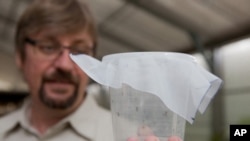Australian researchers report success in attacking the insects that carry the dengue virus, a rarely fatal disease that nonetheless takes a huge toll in sickness and economic loss in the tropical areas where it is endemic.
There's no vaccine or even a specific treatment for the virus.
The World Health Organization says there may be 50 million dengue infections each year and 40 percent of the world's population is at risk.
The dengue virus is carried by a mosquito called Aedes aegypti, which carries the disease from person to person. Researcher Scott Ritchie of James Cook University says anti-dengue efforts have focused mainly on mosquito control.
"And the only way to control it is through the use of pesticides and perhaps community education, and some of the mosquitoes are getting resistant to those pesticides, so we need something novel and different," Ritchie says.
That's what Ritchie and other scientists have been working on, and they report their results in two papers in the journal Nature.
The researchers describe how the Aedes aegypti mosquito can be infected with a bacteria called Wolbachia, which blocks the ability of the dengue virus to grow, so it can't be passed on to the next person the mosquito bites.
To simulate a real-world situation, they released Wolbachia-infected mosquitoes into an indoor test facility filled with uninfected mosquitoes. Within a few months, the anti-dengue infected insects completely dominated the mosquito population as the infected mosquitoes mated with the uninfected ones.
The researchers then moved from a simulated real-world test to an actual real-world test, releasing the infected mosquitoes in two isolated Australian towns.
Chief investigator Scott O'Neill of Monash University says that as the infected insects were released over period of weeks, they began to dominate the native, uninfected mosquitoes.
"And then most importantly, once the release has stopped, Wolbachia continued to increase until the experiments came to a conclusion at the end of the wet season. And about that time we can see that we have almost complete penetration of the Wolbachia infection into the mosquito population at these sites."
Another team member, Ary Hoffman of the University of Melbourne, says the researchers next need to release Wolbachia into an area where dengue is endemic, to see if it actually prevents the disease.
"And until we go through that exercise, we would have to be cautious," Hoffman says. "So I think it's early...You know, at the moment we're very hopeful. But before we get to the stage where we can say, hey, Wolbachia can control dengue, that's a different matter, that's a bit down the track."
In a commentary also published in Nature, Johns Hopkins scientist Jason Rasgon says the Australia research heralds what he calls "the beginning of a new era in the control of mosquito-borne diseases," and suggests a strategy that could also apply to malaria.
Rasgon also notes that effects on the ecosystem should be minimal because the mosquitoes were changed, not eliminated.










